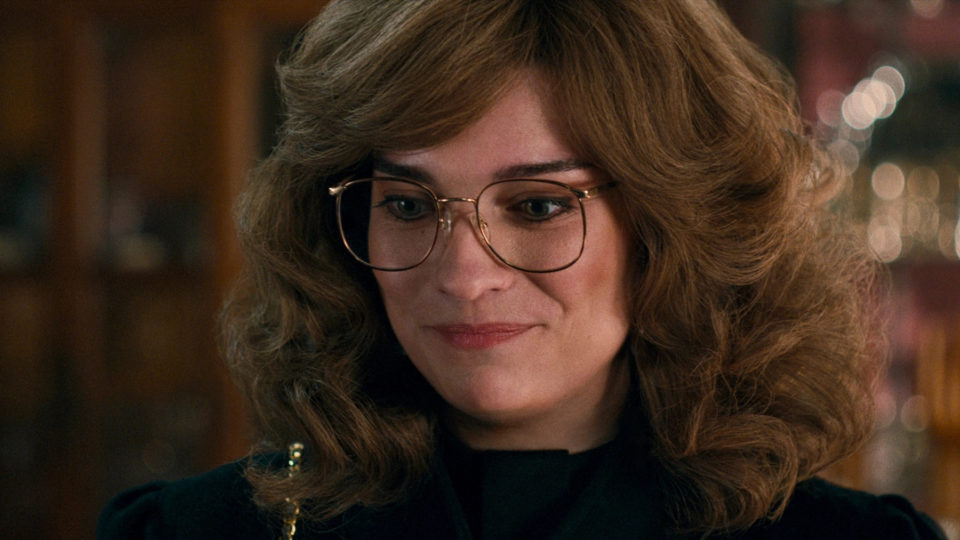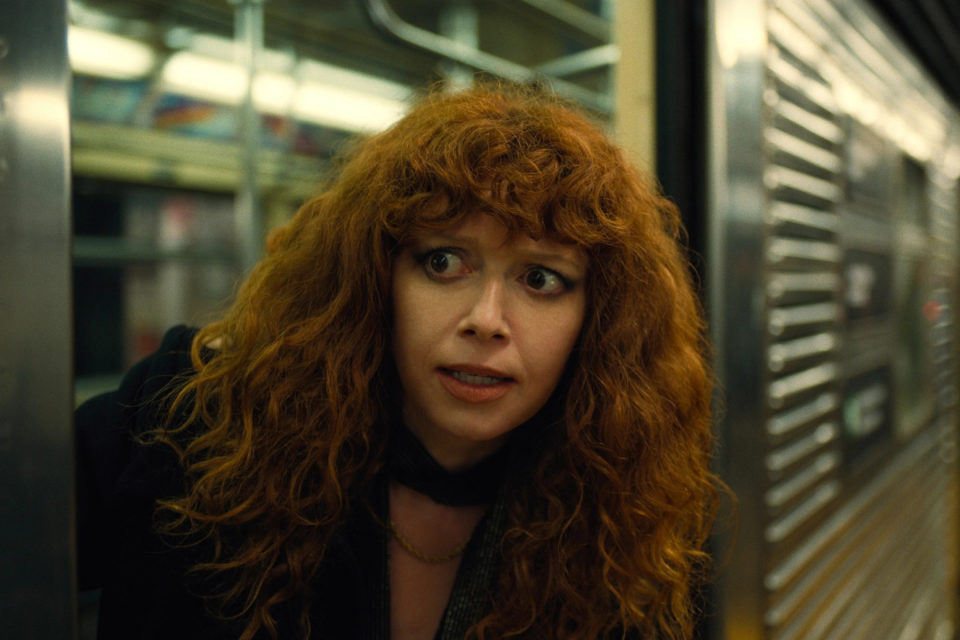‘Russian Doll’ Season 2: Natasha Lyonne Has the Time Travel of Her Life
After a three-year hiatus, the metaphysically-minded series is back, sending its main character into different decades and down mental rabbit holes galore
★★★★
Second seasons: What a concept!
The original eight-episode run of Netflix’s Russian Doll was an instant classic, perfectly melding a familiar, larger-than-life premise with an idiosyncratic star. In Nadia Vulvokov, a self-destructive software designer who kept dying and being resurrected at her 36th birthday party, Natasha Lyonne co-created (with Leslye Headland and Amy Poehler) the eccentric, hyperverbal part she was born to play. Season One was simultaneously funny, tragic, scary, and just plain weird, especially after Nadia discovered that her temperamental opposite, the repressed Alan (Charlie Barnett), was caught up in the same time loop as her. By the time Nadia and Alan worked their way out of their shared predicament, the series felt like a triumph.
But was it too much of a triumph? Lyonne told me at the time that she had ideas for future seasons. But it felt as if she had poured so much of herself into this character, and she and her collaborators had so expertly pulled off a high-wire act, that all involved might have been better off taking a bow and moving onto other things. What was there to do next: Nadia and Alan start repeating a different day?
More than three years after it debuted, Russian Doll is finally back with a seven-episode sequel season. There are occasionally moments that feel like Lyonne is just playing the hits: Nadia says “cock-a-roach” in her miles-thick New York accent within the premiere’s first five minutes, and Harry Nilsson’s “Gotta Get Up” (which played the role of “I’ve Got You, Babe” in Nadia’s initial Groundhog Day adventure) eventually finds its way onto the soundtrack again. But Season Two is no lazy rehash. The tone is similar, even though the story and sci-fi gimmick are different. In many ways, it’s more audacious in scope and themes. And if the end result is a good bit messier than the 2018 edition, the level of ambition, and the pleasure of being back in Nadia’s company, more than makes up for it.
The show more or less picks up in real time. Nadia’s 40th birthday is approaching, and while her advancing age doesn’t trouble her — “I’ve never been young,” she acknowledges — there is also a sense that she didn’t learn quite as much as she should have from her live-die-repeat experience. She and Alan have stayed friends, and she is more attentive to the well-being of her late mother’s best friend Ruth (Elizabeth Ashley), but she’s still enjoying too many substances she shouldn’t (she describes her lungs as “two shriveled-up Nick Caves”) and acting like she’s indestructible long after she lost the video-game-style ability to respawn after being killed.

Rather than turn her back into a flame-haired Phil Connors, the new season sends both Nadia and Alan on journeys much further back in time, starting with her landing in the East Village circa 1982 for the heyday of her mother, Nora (Chloë Sevigny, in an expanded role from her Season One cameos). Netflix’s restrictive, Matthew Weiner-esque Do Not Reveal list prohibits me from discussing the mechanism by which our heroes visit the past. But I can say that it fits into a familiar pop-culture archetype every bit as much as the Groundhog Day framing did, and it creates some hilariously twisted metaphysical concerns for our travelers, Nadia especially.
Lyonne and company make the smart decision to treat Nadia and Alan as veterans of this kind of superhuman experience by now. Not only do they not really stop to question what is happening, or how, but when they have to convince other people, it requires barely any effort at all. As one of Nadia’s long-dead relatives tells her, “There are things in life that cannot be explained.” And there are things that are simply better off not being explained in shows like this one, especially when those scenes are almost never interesting. It’s more entertaining to simply enjoy Nadia continuing to be such a comic force of nature.
Much of the season concerns Nadia’s quest for a treasure stolen from her Hungarian Jewish ancestors in World War II. Back in the present at one point(*), Nadia begins Googling information about the descendant of one of the Nazi thieves; as is often the case, she quickly gets distracted and begins looking at Peter Falk’s Wikipedia page. Like a lot about Nadia, this is a case of the creator-writer-director-star blurring the line between actor and character. Lyonne is a longtime fan of the preternaturally likable Columbo hero, and you can see a lot of Falk’s rumpled, tenacious, and digressive spirit in the way Nadia galumphs her way through these weird events. At the same time, there are many aspects to the character that are uniquely her own; it’s hard to imagine Lt. Columbo declaring “Purim came early this year!” after a stranger offers a couple of quaaludes and a chance to make out with him.
(*) In another 2022 sequence, Nadia and her friend Maxine (Greta Lee) travel to Budapest, which leads to a philosophical discussion about how flying east to a different time zone is itself a form of going into the past.
The season could use more of Alan, because Charlie Barnett’s gentle, nervous energy melds so well with Lyonne’s more aggressive aura. Schitt’s Creek alum Annie Murphy provides a similar sensibility as a character Nadia meets in the Eighties, but Barnett is missed for long stretches — perhaps because he was too busy starring in NBC’s since-canceled Ordinary Joe with James Wolk? (If so: not great, Bob!)But Russian Doll holds up fine despite the absence of other Season One participants. Headland, who helped set the visual and emotional tones for the series as the first season’s chief director, does not helm any episodes this time around. Instead, Lyonne is behind the camera for four of them, and Alex Buono for the other three. Things look even cooler and freakier here than they did in 2018, like a scene where Nora wanders into a Crazy Eddie electronics store and sees herself projected onto what looks like an infinite number of TV screens.

Midway through the season, Nadia and Alan catch up to compare notes on where (and when) they’ve been, and Nadia is dismayed to learn that her pal has opted to simply enjoy visiting another era without rocking the temporal boat. She tells him “Alan, the only reason to go into the past is to change shit, alright? I mean, haven’t you ever seen a movie?” But so much of the season — and Russian Doll as a whole so far — is about how even in a world full of palpable cosmic forces, there is no magic trick to changing your life. The things Nadia wants to fix about herself require much more than a cross-era treasure hunt, even if it’s a blast to watch her try.
So, no, it is not the immaculate experience that the first season was. But in reaching further and trying more, Russian Doll Season Two ultimately justifies the series’ existence as more than just a one-shot. Where once it was hard to see how a continuation might work, now it wouldn’t feel the least bit surprising for Nadia to, say, be abducted by aliens who are baffled by her ability to namecheck all the members of Kraftwerk. As Nadia tells a loved one, “Inexplicable things happening is my entire modus operandi.” Here’s to more of the inexplicable lying ahead, for her and us both.
All seven episodes of Russian Doll Season Two begin streaming on Netflix on April 20. I’ve seen the whole season.
From Rolling Stone US.








